Some of my favourite investing books
If you want to become a better investor then one of the best things you can do is read a lot. During my time as a professional analyst I read lots of books on investing and company analysis - usually on my morning and evening train journeys into London. I am still reading new books today.
I have to say that reading investment books has probably been one of the best investments that I have made in myself. The knowledge I have gathered and the new tools I have learned have been extremely useful. I have no doubt that they have made me a better analyst and investor.
Given the huge number of books out there it can be quite difficult to say which ones are the best. Some are very technical and very hard for the lay person to understand. There are, however, some gems out there.
Here is a list of some of the investing books that I have found to be very useful over the years. They are focused on long-term investing rather than short-term trading.
Phil Oakley's debut book - out now!
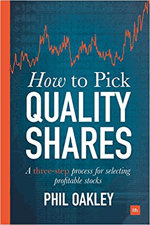
Phil shares his investment approach in his new book How to Pick Quality Shares. If you've enjoyed his weekly articles, newsletters and Step-by-Step Guide to Stock Analysis, this book is for you.
Share this article with your friends and colleagues:
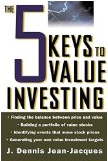 | The 5 Keys to Value Investing J Dennis Jean-Jacques This is a very well-written book about how to research and manage your investments. It is not a book for the absolute beginner but it is packed full of practical advice and is easy to read. The appendix is one of the most valuable sections of the book. Section C "The Critical Failings of EBITDA" is a must-read for any serious DIY or professional investor. |
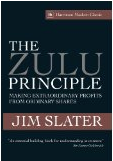 | The Zulu Principle Jim Slater For me, this is still the greatest book on investing written by a British author. It is beautifully written in plain English and is full of wisdom that is still relevant today. Readers gain from the insights of legendary investor Jim Slater and how he went about identifying winning shares. You will learn about the merits of investing in the shares of small companies, the importance of growth and how to value shares using the PEG ratio. If you were to buy just one book to help you with your investing, you could do a lot worse than buying this one. |
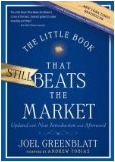 | The Little Book that Beats the Market Joel Greenblatt This book is about one of the simplest and most powerful investment strategies out there. It's all about buying great businesses at cheap prices. It is extremely well written and can be read in an hour or two at most. The practical advice can be found at the back of the book. Whilst this is a good book, I think the strategy needs to be tweaked a little to make it more effective (click here to read my thoughts on this). People just getting started in investing who want to learn a bit more will enjoy this book and get a great deal of value from it. |
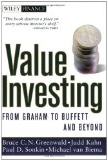 | Value Investing from Graham to Buffett and beyond Bruce Greenwald et al This is a really good book. It goes into great detail about how to be a value investor with lots of practical examples on how to value companies. The case studies on WD-40 and Intel are excellent, especially the application of Earnings Power Value (click here to read more about EPVs) and can be applied to any non-financial company. This material is not for the beginner but for those who are happy to crunch a few numbers. The second part of the book includes some great background on famous value investors such as Seth Klarman, Walter Schloss and Mario Gabelli. |
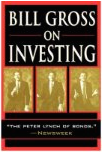 | Bill Gross on Investing Bill Gross Bill Gross is famous for being a bond investor but his book has a lot of useful advice for share investors too. A lot of this book is about his view on how the economy works and what it means for the future of bond investing. There's some good stuff in here about business cycles and demographics. I particularly like Chapter 6 "The Plankton Theory" which is a great way of understanding how certain markets work. An enjoyable and useful read. |
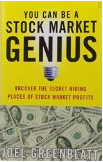 | You can be a stock market genius - uncover the secret hiding places of stock market profits Joel Greenblatt This is another useful book from Joel Greenblatt but is more advanced than "The Little Book that beats The Market". It shows you how you can make money by investing in areas that lots of professional investors ignore. There's some good stuff about buying shares in businesses that are split off from bigger companies (known as spin-offs) and how to profit when one company announces a merger with another. Greenblatt also spends time talking about the opportunities that can arise from bankruptcies and company restructurings. He tells you where to look for opportunities. A good book for those looking to open up some new ideas for their investing approach. |
 | Free Cash Flow - seeing through the accounting fog machine to find great stocks George C Christy This is probably my favourite practical investment analysis book. I believe that to find good investments you have to study a company's cash flow rather than its income statement. This book is packed full of practical examples of how you go about doing that. The free cash flow worksheet in Chapter 6 is very good. This is not a book for beginners or for people who are not comfortable with numbers. If you are the kind of investor that has the time and patience to do a bit of legwork then buying this book will be money well spent. |
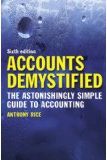 | Accounts Demystified - the astonishingly simple guide to accounting Anthony Rice If you are going to run your own share portfolio then understanding company accounts is something that will help you no end. The trouble is that accounting can be a very dry subject that bores people. Take the time to understand accounting and you will be able to get so much more out of some of the great investing books out there. This book is aimed at complete novices; it helps you understand a set of accounts and gives a good start on analysing a company as well. It is clearly set out and very well-written. If you know absolutely nothing about accounts this book would be a very helpful starter before reading my own Step-by-Step Guide to Investment Analysis. |
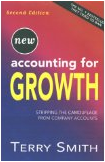 | Accounting for Growth - stripping the camouflage from company accounts Terry Smith Terry Smith is someone you should listen to. He is a great example of how analysing a company's accounts can give you an edge as an investor because not many people really do it properly. Accounting for growth caused a bit of a storm when it was published as it exposed many high profile companies for their shoddy accounting. This book is very well written and still contains lots of relevant advice. The chapters on changes in depreciation policy and the capitalisation of costs (sticking expenses on the balance sheet to boost profits) are a must read. Not for absolute beginners though as you need a basic knowledge of company accounts. |
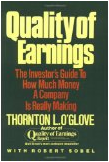 | Quality of Earnings - The investor's guide to how much money a company is really making Thornton L O'Glove This is a very readable book for investors who want to scrutinise a company's accounts. It's a book for sticking on the shelf and dipping in and out of as well. For me, Chapters 8 and 9 are the most valuable as they concern some of the more common ways of detecting companies with dodgy profits. Chapter 8 shows you how to detect strange goings on by looking at a company's debtors and inventories. Chapter 9 focuses on debt and cash flow analysis. If you want to protect yourself from bad companies then this is a useful book to buy. |
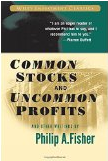 | Common Stocks and Uncommon Profits Philip Fisher This book is seen as an investment classic but is not an easy read. The way it is laid out actually makes it quite heavy going. It was first published in 1958 and represented a much different approach to investing at the time. Fisher's investing philosophy was based on buying quality businesses that could grow their profits over the long haul as opposed to cheap companies that paid big dividends. His thinking had a big influence on the investing strategy of Warren Buffett. Fisher has lots of good advice for the private investor which can broadly be summed up as owning high quality businesses for the long term is more profitable and less risky. |
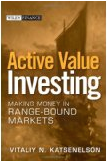 | Active Value Investing - making money in range bound markets Vitaliy N Katsenelson This book is a bit more advanced but is well worth the effort. The author wrote it back in 2007 from the view that stock markets will be stuck in a range between peaks and troughs for a long time. Investors therefore have to behave differently. He sets out an investing framework based on quality, valuation and growth and tells you how to look for these in a company. A great deal of attention is placed on paying the right price for a share as this is the key determinant of how successful you will be. There's also a good discussion on the psychology behind buying and selling shares which is very useful. |
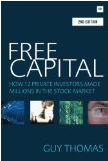 | Free Capital - How 12 private investors made millions in the stock market Guy Thomas This is a really interesting book which profiles twelve private investors who amassed stock market fortunes of more than £1 million from very modest beginnings. The good thing about this book is that it shows you that you do not need to be a professional fund manager to be a good investor. It also highlights that there are many different ways to make money. There are some good bits about the characteristics and lifestyles of the different investors as well. A very interesting study of real-world private investors. |
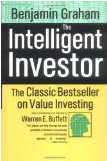 | The Intelligent Investor Benjamin Graham One of the most famous investing books of all time and still one of the best. Whilst some of Graham's ways of looking at shares are a little outdated in today's stock markets, you will learn a lot from reading the book. Chapter 8 "The investor and Market Fluctuations" and Chapter 20 "Margin of Safety" contain some of the best advice ever given to investors. You'll also find some great discussion on stock market valuations and advice for running a portfolio. Warren Buffett's "The Superinvestors of Graham-and-Doddsville" piece at the back is a great read. |
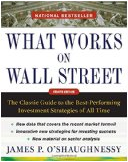 | What works on Wall Street - the classic guide to the best performing investment strategies of all time James P O'Shaughnessy If you like the idea of investing by numbers and taking a lot of human emotion out of your investing then this could be a book for you. This is a fascinating book which pores over the investment performance of lots of different strategies. It will give you an insight into what has worked in the past and when it hasn't and also help you understand why. It is worth remembering that a lot of these studies are based on buying and selling large numbers of shares which lots of private investors would struggle to copy. |
If you have found this article of interest, please feel free to share it with your friends and colleagues:
We welcome suggestions for future articles - please email me at analysis@sharescope.co.uk. You can also follow me on Twitter @PhilJOakley. If you'd like to know when a new article or chapter for the Step-by-Step Guide is published, send us your email address using the form at the top of the page. You don't need to be a subscriber.
This article is for educational purposes only. It is not a recommendation to buy or sell shares or other investments. Do your own research before buying or selling any investment or seek professional financial advice.